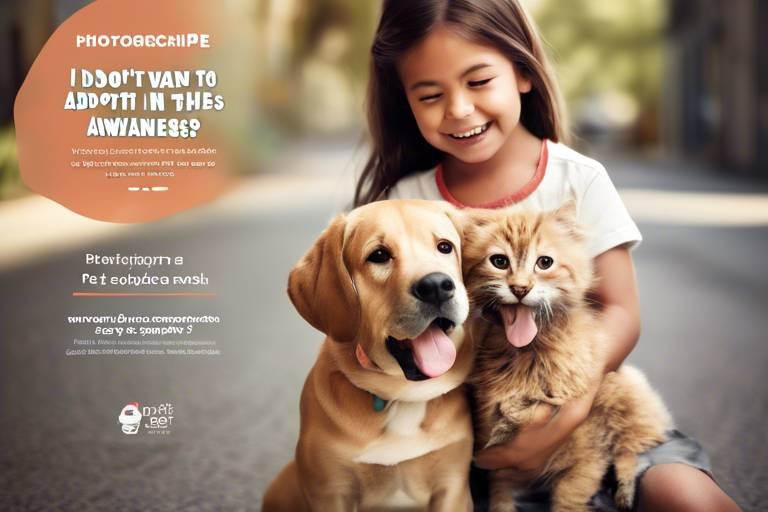How to Foster a Positive Attitude Toward Pet Adoption
Have you ever thought about how adopting a pet can change not just their life, but yours too? When we talk about pet adoption, we’re diving into a world filled with love, companionship, and a chance to make a real difference. This article explores the importance of pet adoption, the benefits it brings to both pets and their new owners, and effective strategies to promote a positive outlook on adopting pets in our communities. By understanding the emotional rewards and practical advantages of welcoming a furry friend into your home, we can inspire more people to consider adoption as a viable option.
Adopting a pet comes with numerous advantages that go beyond just having a cute face to greet you at the door. For starters, pets provide companionship that can alleviate feelings of loneliness and depression. Imagine coming home after a long day, and there’s a wagging tail or a soft purr waiting for you. That’s the magic of companionship! Furthermore, pets can offer significant emotional support, helping to reduce stress and anxiety levels. Studies have shown that interacting with animals can release oxytocin, the “love hormone,” which promotes bonding and reduces stress.
But wait, there’s more! By adopting a pet, you’re not just gaining a friend; you're also saving a life. Shelters are often overcrowded, and by choosing to adopt, you’re giving an animal a second chance at happiness. This selfless act can be incredibly fulfilling, knowing that you’ve made a positive impact on a life that was once in peril. So, why not share the love and consider adopting your next pet?
Despite the many benefits, there are still numerous myths surrounding pet adoption. One of the most common misconceptions is the belief that shelter animals are problematic or have behavioral issues. This couldn’t be further from the truth! Many shelter animals are simply victims of circumstance, such as owners moving or financial hardships. Addressing these misconceptions can help shift perceptions and promote a more positive attitude toward adopting.
Shelter animals often come from diverse backgrounds, and many are loving and well-behaved. It’s essential to educate potential adopters about their histories, as this can help dispel fears and encourage adoption. For example, did you know that many shelters conduct behavioral assessments to ensure animals are suitable for adoption? These evaluations reassure potential adopters about the animals' temperaments and compatibility.
Understanding these evaluations can be a game-changer for potential adopters. Shelters assess the animals’ behavior, looking for signs of friendliness, playfulness, and adaptability. This process ensures that the animals are not only healthy but also ready to become loving companions. If you’re considering adoption, ask about these assessments to feel more confident in your decision.
Another common concern is the fear of not knowing how to train a new pet. Fortunately, many shelters provide training resources and support for new pet owners. From obedience classes to tips on integrating a new pet into your home, these resources can ease concerns and ensure a smoother transition for both the pet and the owner. Remember, adopting a pet is a lifelong commitment, but with the right support, it can also be one of the most rewarding experiences of your life!
Sharing heartwarming success stories of adopted pets can inspire others to consider adoption. These narratives showcase the positive impact of adopting animals on both pets and their new families. For instance, think about a dog named Max who was once abandoned and scared but found a loving family through adoption. His transformation from a timid pup to a joyful companion illustrates the profound change that adoption can bring. By sharing these stories, we can ignite hope and motivate others to open their hearts and homes to shelter animals.
Community events focused on pet adoption can create a supportive environment that fosters a culture of adoption. Engaging the public through events can increase awareness about available pets and encourage people to consider adopting. For example, adoption fairs provide an opportunity for potential adopters to meet various animals in one place, helping to facilitate connections between pets and their future families.
These events are like a matchmaking service for pets and people! By bringing together a variety of animals, adoption fairs allow individuals to find the perfect companion that matches their lifestyle and personality. Plus, they often feature fun activities and opportunities to learn more about responsible pet ownership.
Encouraging community members to volunteer at shelters not only helps the animals but also builds positive relationships between people and pets. Volunteers can share their experiences to further promote adoption and inspire others to take the plunge. Imagine the ripple effect of one person’s positive experience leading to countless others choosing to adopt!
Educating the public about the importance of pet adoption can significantly influence attitudes. Schools, community centers, and social media are effective platforms for spreading awareness and encouraging responsible pet ownership. Hosting workshops and seminars can provide valuable information about pet care and the benefits of adoption, empowering potential adopters with knowledge and confidence.
These educational sessions can be a treasure trove of information for anyone considering adoption. They offer insights into pet care, training, and the responsibilities that come with pet ownership. By attending these workshops, potential adopters can feel more prepared and excited about welcoming a new furry friend into their lives.
Social media is a powerful tool for promoting pet adoption. By sharing stories, photos, and information about available pets, we can reach a wider audience and inspire more people to adopt. Platforms like Instagram and Facebook can showcase adorable animals looking for homes, creating a buzz that might just lead to a life-changing decision for someone scrolling through their feed.
Q: What are the costs associated with pet adoption?
A: Adoption fees can vary widely depending on the shelter, but they typically cover vaccinations, spaying/neutering, and sometimes even basic training. It's often much more affordable than buying a pet from a breeder.
Q: How do I choose the right pet for my lifestyle?
A: Consider factors like your living situation, activity level, and the time you can dedicate to training and care. Visiting shelters and interacting with different animals can help you find the perfect match.
Q: What if I have other pets at home?
A: Many shelters will help you assess whether a new pet will get along with your current animals. Introducing pets slowly and carefully can lead to harmonious households.

The Benefits of Pet Adoption
Adopting a pet is more than just bringing a furry friend into your home; it's a life-changing experience for both you and the animal. First and foremost, companionship is one of the most significant benefits of pet adoption. Imagine coming home after a long day and being greeted by a wagging tail or a gentle purr. This bond can provide emotional support, reducing feelings of loneliness and increasing overall happiness. Studies even show that having a pet can lower stress levels and improve mental health.
Furthermore, adopting a pet is a noble act that helps save lives. Each year, millions of animals enter shelters, many of whom are in desperate need of a loving home. When you choose to adopt, you're not just gaining a pet; you're also giving a second chance to an animal that may have faced abandonment or neglect. This act of kindness can be incredibly fulfilling and can even inspire others in your community to consider adoption as well.
Additionally, pet adoption can be more economical than purchasing a pet from a breeder. Shelters often charge a fraction of the price, and many include vaccinations, spaying or neutering, and initial health checks in their adoption fees. This means you save money while also ensuring your new companion is healthy and ready for a happy life with you.
Moreover, adopting a pet can lead to unexpected health benefits. Studies have shown that pet owners often experience lower blood pressure and cholesterol levels, which can lead to a longer lifespan. The simple act of petting a dog or cat can release oxytocin, the "love hormone," which helps to reduce stress and promote feelings of happiness and connection.
In addition to the emotional and financial benefits, pet adoption also contributes to the larger community. By adopting, you help reduce the number of homeless animals and contribute to the fight against overpopulation. This creates a ripple effect that can lead to fewer strays on the streets and a healthier environment for everyone.
In summary, the benefits of pet adoption are vast and varied. They include:
- Companionship: Provides emotional support and reduces loneliness.
- Saving Lives: Gives a second chance to animals in need.
- Cost-Effective: Lower adoption fees often include necessary medical care.
- Health Benefits: Promotes physical and mental well-being.
- Community Contribution: Helps reduce overpopulation and stray animals.
Ultimately, when you adopt a pet, you're not just gaining a companion; you're also making a positive impact on the world around you. So why not take the leap? You might just find that the love and joy an adopted pet brings into your life is immeasurable.

Common Misconceptions About Adoption
When it comes to pet adoption, many people harbor misconceptions that can deter them from considering this life-changing option. One of the most common myths is that shelter animals are problematic. This belief stems from the idea that animals in shelters are there due to behavioral issues or past traumas. However, the truth is that many shelter pets are simply victims of circumstance—abandoned, lost, or surrendered due to their owners' life changes. It's essential to recognize that these animals are often just as loving and deserving of a home as any purebred.
Another prevalent misconception is that adopting a pet is more expensive than purchasing one from a breeder. In reality, adoption fees are generally much lower than the costs associated with buying a pet. Most shelters include essential services like vaccinations, spaying or neutering, and even microchipping in their adoption fees. This means that not only are you saving a life, but you're also getting a pet that is often already prepared for a loving home.
Many potential adopters also believe that shelter animals are untrained or difficult to manage. In fact, shelters often conduct behavioral assessments to evaluate each animal's temperament. This helps ensure that pets are matched with suitable families. Moreover, many shelters provide resources for training and support, making the transition to a new home smoother. It’s crucial to understand that with a little patience and guidance, most pets can adapt well to their new surroundings.
To help dispel these myths, it’s important to share accurate information and success stories. For instance, did you know that a significant percentage of shelter animals are already house-trained? This is often due to their previous living situations. By educating potential adopters about these realities, we can shift the narrative surrounding pet adoption.
In addition to these common misconceptions, many people worry about the health issues associated with shelter pets. While it’s true that some animals may come with health challenges, shelters typically conduct thorough health checks and provide necessary treatments before an animal is put up for adoption. This means that when you adopt, you’re often choosing a pet that has been cared for and is ready to join your family.
Ultimately, addressing these misconceptions is crucial for fostering a positive attitude toward pet adoption. By understanding the realities of shelter animals and the benefits of adoption, we can encourage more people to consider opening their hearts and homes to a furry friend in need.
- Are shelter pets healthy? Yes, most shelters conduct health checks and provide necessary vaccinations before adoption.
- What if I want a specific breed? Many shelters have breed-specific rescues, and you can often find purebred animals available for adoption.
- Can I return the pet if it doesn't work out? Most shelters allow returns within a specified period if the adoption doesn’t work out.
- Do I need to pay to adopt a pet? Yes, there is usually an adoption fee, but it is often much lower than purchasing from a breeder and includes essential services.
Understanding Shelter Animals
When we think about adopting a pet, it’s crucial to understand the unique stories and backgrounds of shelter animals. Many people have misconceptions that shelter pets are problematic or have behavioral issues. However, the reality is often quite different. Shelter animals come from a variety of circumstances, and their past does not define their future. In fact, many of these animals are simply victims of unfortunate situations, such as their previous owners facing hardships, moving, or even passing away.
In shelters, you’ll find a diverse array of animals, each with their own personality and charm. From playful puppies to wise old cats, these animals are just waiting for a second chance at love and companionship. It's essential to recognize that many shelter pets are already socialized and have had some form of training, making them great candidates for adoption. Here are a few key points about shelter animals:
- Temperament: Many shelters conduct behavioral assessments to evaluate the temperament of their animals. This means that potential adopters can be matched with pets that fit their lifestyle and personality.
- Health: Most shelters ensure that their animals are up-to-date on vaccinations and are spayed or neutered before adoption, providing peace of mind for new pet owners.
- Support: Shelters often offer post-adoption support, including training resources and advice, to help new pet owners settle in with their furry friends.
Understanding the backgrounds of shelter animals can greatly help in dispelling fears and misconceptions. For instance, many animals in shelters may have been surrendered due to no fault of their own. By educating potential adopters about the real stories behind these animals, we can foster a more compassionate outlook toward adoption.
It's also worth noting that every animal has its own personality. Some may be shy and need a little time to warm up, while others are outgoing and ready to play. By spending time with shelter animals, potential adopters can find the perfect match for their home. It’s akin to searching for a puzzle piece that fits just right—the right pet can bring joy, companionship, and a sense of fulfillment to your life.
In conclusion, understanding shelter animals is about more than just recognizing their past; it’s about envisioning their future. Each animal is a blank slate, ready to create new memories with a loving family. By shifting our perspective and embracing the unique qualities of shelter pets, we can help ensure that more animals find their forever homes.
Q: Are shelter animals trained?
A: Many shelter animals have received some level of training, and shelters often conduct behavioral assessments to match pets with suitable adopters.
Q: What if I have children or other pets?
A: Shelters can help you find a pet that fits well with your family's dynamics. They often have information on the animal's temperament and behavior around children and other pets.
Q: Can I return the pet if it doesn’t work out?
A: Most shelters have a return policy, allowing adopters to bring back the pet if it does not fit their home. It's essential to discuss this with the shelter during the adoption process.
Q: How can I support my new pet during the transition?
A: Providing a calm environment, establishing a routine, and being patient as they adjust can help your new pet feel secure in their new home.
Behavioral Assessments
When it comes to adopting a pet, one of the most reassuring aspects is the that many shelters conduct. These assessments are crucial because they provide a glimpse into the animal's personality and temperament, helping potential adopters make informed decisions. Imagine walking into a shelter and feeling overwhelmed by the variety of adorable faces looking back at you. How do you choose? This is where behavioral assessments come into play, acting like a roadmap that guides you toward the right match for your home and lifestyle.
Typically, a behavioral assessment involves a series of tests and observations that evaluate how an animal interacts with people, other pets, and its environment. For instance, staff may observe how a dog reacts to being approached by a stranger or how a cat responds to different stimuli. These evaluations help identify whether an animal is shy, energetic, friendly, or perhaps more reserved. Understanding these traits can significantly ease the minds of potential adopters who may have concerns about how an animal will fit into their family.
Moreover, these assessments can help uncover specific needs that an animal may have. For example, a dog that shows high energy levels may thrive in an active household, while a more laid-back cat could be perfect for someone looking for a cuddly companion. By knowing these details, adopters can make choices that not only benefit the animal but also ensure that their home becomes a harmonious space for everyone involved.
It's important to note that behavioral assessments are not just about identifying problems; they also highlight strengths. Many shelters take pride in showcasing animals that have passed their assessments with flying colors, demonstrating that these pets can be loving, well-adjusted companions. This positive reinforcement encourages potential adopters to look beyond common stereotypes associated with shelter animals.
In addition to the assessments themselves, many shelters provide resources and support to help new pet owners understand their adopted animal's behavior better. For example, if a dog has been identified as having a playful demeanor, the shelter might offer tips on how to engage in fun activities that stimulate the pet's mind and body. This ongoing support is invaluable, as it not only helps ease the transition for the animal into its new home but also empowers the adopter with knowledge and confidence.
In summary, behavioral assessments are a vital part of the pet adoption process. They serve as a bridge between the shelter and potential adopters, ensuring that both parties find a suitable match. By understanding the importance of these assessments, we can foster a more positive attitude toward pet adoption, encouraging more people to give loving homes to animals in need.
- What is a behavioral assessment? A behavioral assessment is an evaluation conducted by shelter staff to observe an animal's temperament and behavior in various situations.
- Why are behavioral assessments important? They help potential adopters understand an animal's personality, ensuring a good match for both the pet and the owner.
- Can I trust the results of a behavioral assessment? Yes, shelters use standardized methods to conduct these assessments, providing a reliable overview of an animal's behavior.
- What resources are available for new pet owners? Many shelters offer training resources, support groups, and informational materials to help new adopters integrate their pets into their homes.
Training and Support
When it comes to welcoming a new furry friend into your home, can make all the difference. Many shelters understand that the transition from shelter life to a loving home can be overwhelming for both pets and their new owners. That's why they often provide a variety of resources designed to help you and your new pet adjust to each other. Imagine having a roadmap for your journey together—this is exactly what these training programs offer!
First and foremost, shelters typically provide basic obedience training classes. These classes are not just about teaching your pet to sit or stay; they are essential for building a strong bond between you and your new companion. Engaging in training sessions can be a fun way to learn more about your pet's personality and quirks. Plus, it helps instill good behavior, which can lead to a more harmonious household.
In addition to training classes, many shelters offer support groups or workshops for new pet owners. These gatherings provide a platform for sharing experiences and tips, making you feel less alone in your journey. You might find yourself chatting with others who are going through the same challenges, whether it's potty training or dealing with separation anxiety. The support from fellow pet parents can be invaluable!
Moreover, shelters often have a wealth of resources available, including guides on pet care, behavioral tips, and even access to veterinary services. For instance, some shelters partner with local veterinarians to provide discounted services for adopted pets. This can ease the financial burden of initial health checks and vaccinations, ensuring your new friend starts their life with you on the right paw.
To further illustrate the importance of training and support, consider the following table that outlines some common training resources provided by shelters:
| Resource Type | Description | Benefits |
|---|---|---|
| Obedience Classes | Basic training sessions for new pets. | Improves behavior, strengthens bond. |
| Support Groups | Meetings for new pet owners to share experiences. | Builds community, offers practical advice. |
| Pet Care Guides | Informational resources on various pet care topics. | Empowers owners with knowledge. |
| Veterinary Partnerships | Discounted veterinary services for adopted pets. | Reduces initial healthcare costs. |
Ultimately, the training and support provided by shelters can ease the anxiety of adopting a pet and help ensure a successful transition into your home. By taking advantage of these resources, you're not just adopting a pet; you're setting the stage for a lifelong partnership filled with love, joy, and mutual respect.
Q: What kind of training is available for adopted pets?
A: Most shelters offer basic obedience training classes, which cover essential commands and behaviors. Some may also provide specialized training for specific issues.
Q: How can I find support after adopting a pet?
A: Many shelters host support groups and workshops for new pet owners. These can be great opportunities to connect with others and share experiences.
Q: Are there any costs associated with training programs?
A: While some shelters offer free classes, others may charge a nominal fee to cover materials. It's best to check with your local shelter for specific details.
Q: Can I get veterinary help for my adopted pet?
A: Yes, many shelters have partnerships with local veterinarians that offer discounted services for adopted pets, making it easier to access necessary healthcare.
Success Stories of Adoption
When it comes to pet adoption, nothing warms the heart quite like a success story. These tales of transformation not only highlight the incredible bond between humans and animals but also serve as a beacon of hope for those considering adopting a furry friend. Imagine walking into a shelter, feeling a mix of excitement and apprehension, and then stumbling upon a pet that seems to choose you. That moment can lead to a lifetime of joy!
Take, for instance, the story of Max, a scruffy little terrier mix who had been at the shelter for over six months. His previous life was filled with uncertainty, and he arrived at the shelter timid and scared. However, after some time spent with volunteers who showered him with love and attention, Max began to blossom. His transformation was remarkable, and eventually, a loving family spotted him at an adoption fair. They were captivated by his playful spirit and gentle demeanor. Today, Max enjoys a life filled with adventure, from long hikes in the woods to cozy evenings on the couch with his new family.
Then there’s the inspiring journey of Whiskers, a once-abandoned cat who had lost hope. After being rescued, she found herself in a foster home, where she learned to trust humans again. Her foster mom shared Whiskers' story on social media, showcasing her quirky personality and adorable antics. It wasn’t long before a couple fell in love with her online and decided to adopt her. Now, Whiskers is the queen of her new castle, ruling her domain with a gentle paw and bringing endless joy to her new owners.
These stories remind us that adoption is not just about giving an animal a home; it’s about creating a family. Each pet has a unique story that deserves to be told, and when shared, these narratives can inspire others to take that leap of faith and adopt. In addition to individual stories, shelters often compile statistics about successful adoptions to showcase their impact. For example, a local shelter might report:
| Year | Adoptions | Success Rate (%) |
|---|---|---|
| 2021 | 150 | 75 |
| 2022 | 200 | 85 |
| 2023 | 250 | 90 |
These numbers reflect not just the growth of the adoption movement but also the increasing awareness of the joys of adopting pets. Each successful adoption story contributes to a larger narrative that promotes a positive attitude towards pet adoption. So, the next time you think about adopting, remember: you could be the one to write a new success story!
As we wrap up this discussion on the importance of pet adoption, it’s natural to have questions. Here are some frequently asked questions that can provide further insight:
- What should I consider before adopting a pet? It's important to assess your lifestyle, home environment, and ability to commit to a pet's needs, including time, space, and finances.
- How can I prepare my home for a new pet? Ensure that you have all necessary supplies, such as food, water bowls, a comfortable bed, toys, and a safe space for your new friend.
- What if I have other pets at home? Introducing a new pet should be done gradually and carefully. Consult with your shelter or a veterinarian for tips on how to manage introductions.
- Are there any costs associated with adopting a pet? Yes, while adoption fees can vary, it’s essential to budget for ongoing costs such as food, veterinary care, and supplies.

Community Involvement and Events
Community involvement is crucial when it comes to fostering a positive attitude toward pet adoption. When people come together to support a cause, it creates a ripple effect that can lead to significant changes in perceptions and behaviors. Engaging the public through events focused on pet adoption not only raises awareness but also builds a sense of community among animal lovers. Imagine a vibrant scene at a local park, where families, friends, and pets gather to celebrate the joy of companionship and the noble act of giving a shelter animal a second chance. This is precisely the kind of atmosphere that adoption events aim to create.
One of the most effective ways to promote pet adoption is through community events. These gatherings can range from adoption fairs to pet parades, and they serve as a platform for shelters to showcase their animals. By bringing potential adopters face-to-face with pets in need of homes, these events can spark emotional connections that lead to lifelong bonds. In fact, many people who attend adoption fairs often find themselves unexpectedly falling in love with a furry friend they had not considered before. The excitement and energy of these events can transform the often-overlooked idea of adoption into an appealing and heartwarming experience.
Moreover, volunteering at local shelters can significantly enhance community involvement. When individuals dedicate their time to help care for the animals, they not only provide essential support to the shelter but also develop a deeper understanding of the challenges these animals face. Volunteers often share their experiences with friends and family, effectively becoming ambassadors for adoption. As they recount their stories, they help to dismantle myths and misconceptions about shelter animals, showcasing them as loving companions rather than "problems." This grassroots approach to advocacy can create a more informed and compassionate community.
In addition to adoption fairs and volunteering, organized events like workshops and seminars can play a pivotal role in educating the public about the importance of pet adoption. These sessions can cover various topics, from responsible pet ownership to the benefits of adopting over buying. By providing valuable information, attendees leave feeling empowered and more likely to consider adoption as a viable option. The knowledge gained can be transformative—turning curiosity into action.
To illustrate the impact of community events, let's take a look at a recent adoption fair organized by a local shelter:
| Event Name | Date | Location | Animals Adopted |
|---|---|---|---|
| Spring Adoption Fair | April 15, 2023 | City Park | 25 |
| Summer Pet Festival | July 20, 2023 | Community Center | 30 |
| Fall Family Fun Day | October 10, 2023 | Local Fairgrounds | 40 |
As you can see, these events not only facilitate the adoption of numerous pets but also foster a sense of community and shared responsibility among attendees. Each adopted pet represents a life saved and a family made whole, and that is a powerful message to spread through community involvement.
In conclusion, community involvement and events play a vital role in promoting a positive attitude towards pet adoption. By bringing people together, sharing experiences, and educating the public, we can create an environment where adopting a pet is seen as a rewarding and fulfilling choice. So, whether you're attending an adoption fair, volunteering at a shelter, or simply spreading the word among friends, every effort counts in making a difference in the lives of animals in need.
- What should I expect at an adoption fair? Adoption fairs typically feature a variety of animals available for adoption, as well as information on how to care for them. It's a great opportunity to meet pets and ask questions!
- How can I volunteer at my local shelter? Most shelters welcome volunteers and provide information on how to get involved through their websites or by visiting in person.
- Are shelter animals trained? Many shelters conduct behavioral assessments on their animals and often provide training resources for new pet owners.
Adoption Fairs
Adoption fairs are vibrant events that bring together potential pet adopters and animals in need of loving homes. Imagine walking into a lively atmosphere filled with wagging tails, playful kittens, and the warmth of community spirit! These fairs serve as a fantastic platform for shelters to showcase their animals, allowing families to interact with different pets in a relaxed and informal setting. It’s not just about finding a pet; it’s about connecting with a new family member.
At adoption fairs, you can often find a variety of animals, from puppies and kittens to adult dogs and cats. Each animal has its own unique personality, and these events allow you to discover which pet might be the perfect fit for your lifestyle. Potential adopters can ask questions, learn about the animals' backgrounds, and even take them for a short walk or play session. This hands-on experience can significantly ease the decision-making process, making it less intimidating for first-time adopters.
Moreover, adoption fairs are usually accompanied by various activities and resources that enhance the experience. Many fairs feature:
- Meet and Greet Sessions: Interact with animals and their caretakers to learn more about their personalities.
- Educational Workshops: Gain insights into responsible pet ownership, training tips, and how to integrate a new pet into your home.
- Community Resources: Connect with local veterinarians, trainers, and pet supply vendors who can provide ongoing support.
These events not only help animals find homes but also foster a sense of community. They bring together animal lovers and create an environment where sharing stories and experiences is encouraged. For many people, attending an adoption fair can be an eye-opening experience, as they witness the joy of giving a second chance to pets that have faced challenges.
In addition to facilitating adoptions, fairs often feature success stories from previous adopters. Hearing about the positive transformations of once-homeless pets can inspire others to take the leap into adoption themselves. This ripple effect can significantly impact the number of animals that find loving homes, creating a cycle of hope and compassion within the community.
So, if you’re considering adding a furry friend to your family, keep an eye out for local adoption fairs. They are not just about adopting a pet; they are about joining a community that cares deeply for animals. You might just find your new best friend while helping to save a life!
Volunteer Programs
Volunteering at local animal shelters is an incredibly rewarding experience that not only benefits the animals but also enriches the lives of the volunteers. When you step into a shelter as a volunteer, you’re not just helping to care for pets in need; you’re becoming part of a community that is passionate about animal welfare. Imagine walking into a place filled with wagging tails and purring kitties, all waiting for someone to show them love and attention. It’s like stepping into a world where your compassion can make a real difference.
One of the most significant aspects of volunteering is the opportunity to form meaningful connections with animals. Many volunteers find joy in spending time with these pets, whether it’s taking them for walks, playing with them, or simply sitting quietly to offer companionship. These interactions can significantly improve the animals' mental well-being and increase their chances of adoption. It’s a win-win situation! You get to enjoy the unconditional love of a pet, and they get much-needed socialization.
Moreover, volunteering can also help you develop valuable skills. For instance, you might learn about animal behavior, basic training techniques, and even how to administer first aid to pets. These skills are not only beneficial for your personal growth but can also enhance your resume if you’re considering a career in veterinary medicine or animal care. Plus, there’s something inherently fulfilling about knowing that your efforts are contributing to a greater good.
Many shelters offer structured volunteer programs that provide training and support. These programs often include:
- Orientation Sessions: New volunteers typically participate in orientation sessions to learn about the shelter's mission, policies, and procedures.
- Hands-On Training: Volunteers receive hands-on training on how to care for animals, including feeding, grooming, and socialization techniques.
- Ongoing Support: Shelters often have staff members available to answer questions and provide guidance throughout your volunteering journey.
Additionally, volunteering can foster a sense of community. You’ll meet like-minded individuals who share your passion for animals. These connections can lead to lasting friendships and create a supportive network that advocates for animal welfare. Together, volunteers can organize events, fundraisers, and campaigns to raise awareness about the importance of pet adoption. It’s amazing how a group of dedicated people can come together to create change!
In conclusion, volunteering at a shelter is not just about giving your time; it’s about creating a ripple effect of positivity that impacts both animals and people. If you’re looking for a way to give back, consider becoming a volunteer. You’ll be amazed at how much joy and fulfillment it can bring to your life, all while helping those who cannot help themselves.
Q: What are the requirements to volunteer at an animal shelter?
A: Requirements vary by shelter but typically include being at least 16 years old, completing an application, and attending an orientation session.
Q: How much time do I need to commit as a volunteer?
A: Most shelters appreciate any time you can give, whether it’s a few hours a week or a couple of times a month. The more consistent you can be, the better!
Q: Can I volunteer if I have no prior experience with animals?
A: Absolutely! Shelters provide training for new volunteers, so you don’t need prior experience. Just come with a willingness to learn and a love for animals!
Q: Are there age restrictions for volunteering?
A: Many shelters allow volunteers as young as 16, but some may have programs for younger individuals when accompanied by an adult. It's best to check with your local shelter.

Creating Awareness Through Education
Creating awareness about pet adoption through education is not just a noble endeavor; it’s a crucial step towards fostering a community that values and supports the well-being of animals. When people are informed about the realities of pet adoption, they are more likely to make compassionate choices. Think about it—would you jump into a decision without knowing all the facts? Education serves as a bridge that connects potential adopters to the joy and responsibilities of pet ownership.
One of the most effective ways to spread awareness is by hosting workshops and seminars. These events can cover a range of topics, including the benefits of adopting pets, understanding animal behavior, and the responsibilities that come with pet ownership. By providing a platform for discussion, we empower individuals with the knowledge they need to make informed decisions. Imagine a room filled with eager participants learning about the unconditional love a pet can bring into their lives—it’s truly inspiring!
Additionally, utilizing social media can significantly amplify the message. Platforms like Facebook, Instagram, and Twitter are not just for selfies and food pics; they can be powerful tools for change. By sharing heartwarming stories of adopted pets, informative infographics, and eye-catching photos, we can reach a broader audience. For instance, a single post featuring a happy family with their newly adopted dog can spark interest and inspire others to consider adoption. The ripple effect of such posts can be monumental!
To further enhance our educational efforts, we can collaborate with local schools and community centers. Imagine children learning about responsible pet ownership as part of their curriculum! This early exposure can instill a sense of empathy and responsibility toward animals, shaping future generations into compassionate pet owners. Schools can host pet adoption days, where local shelters bring animals for students to meet, creating a direct connection between kids and potential furry friends.
Moreover, it’s essential to address common misconceptions about shelter animals. Many people believe that shelter pets are problematic or have behavioral issues. This couldn’t be further from the truth! By educating the public on the rigorous assessments and training that many shelter animals undergo, we can dispel these myths. For example, shelters often conduct behavioral assessments to ensure that animals are suitable for adoption, providing potential adopters with reassurance about the pets' temperaments.
In conclusion, creating awareness through education is a multifaceted approach that can significantly impact pet adoption rates. By leveraging workshops, social media, and community involvement, we can foster a culture of compassion and responsibility. It’s about building a community that not only understands the importance of adopting pets but also actively participates in making a difference. So, let’s roll up our sleeves and get to work—every little effort counts!
Here are some common questions people have about pet adoption:
- What are the benefits of adopting a pet? Adopting a pet can provide companionship, emotional support, and the joy of saving an animal in need.
- Are shelter animals safe and healthy? Yes! Shelters conduct health checks and behavioral assessments to ensure animals are suitable for adoption.
- What should I consider before adopting a pet? Consider your lifestyle, the time you can dedicate, and the type of pet that fits your home environment.
- Can I return a pet if it doesn’t work out? Most shelters have policies in place for returns, but it’s crucial to discuss this with the shelter before adopting.
Workshops and Seminars
Workshops and seminars are fantastic avenues for spreading the word about the joys and responsibilities of pet adoption. Imagine walking into a room filled with eager faces, all buzzing with excitement about the potential of welcoming a furry friend into their lives. These events are not just about information; they are about creating a community that values and understands the importance of adopting pets. By offering hands-on experiences and interactive sessions, we can break down barriers and misconceptions surrounding adoption.
During these workshops, participants can learn about essential topics such as pet care basics, the benefits of adopting over buying, and the emotional rewards that come from saving a life. For instance, a session might cover the different needs of various breeds, helping potential adopters understand what to expect when they bring a new pet home. Additionally, these workshops often feature guest speakers, such as veterinarians or experienced pet owners, who can share their insights and personal stories, making the information more relatable and impactful.
Moreover, we can incorporate interactive elements like Q&A sessions and live demonstrations on training techniques. This not only engages the audience but also allows them to visualize the bond they can create with their future pets. Imagine a trainer showcasing simple commands, allowing participants to interact with adoptable pets right there in the room. This firsthand experience can be a game-changer, igniting a spark of interest and compassion in many hearts.
To maximize the impact of these workshops, we can also create a follow-up system where attendees receive newsletters or emails with additional resources, success stories, and updates about local shelters. This keeps the momentum going and encourages a lasting commitment to pet adoption. By fostering a culture of learning and support, we can significantly influence people's attitudes towards adopting pets and create a ripple effect that benefits animals in need.
In summary, workshops and seminars serve as powerful tools for educating the public about pet adoption. They not only provide valuable information but also create emotional connections and inspire action. By investing time and resources into these events, we can cultivate a community that champions the cause of pet adoption and makes a positive difference in the lives of countless animals.
- What should I expect at a pet adoption workshop? You can expect to learn about pet care, hear success stories, and participate in interactive sessions with adoptable pets.
- Are there any costs associated with attending these workshops? Most workshops are free or have a minimal fee to cover materials, but it's always best to check in advance.
- Can I adopt a pet during the workshop? While some workshops may have adoptable pets on-site, actual adoption processes usually take place at the shelter or through a designated event.
- How can I get involved in organizing these workshops? Reach out to local shelters or community organizations to express your interest in helping plan and promote these events.
Utilizing Social Media
In today's digital age, social media has transformed how we connect, communicate, and share information. This powerful tool can be harnessed to promote pet adoption and create a wave of positive change in our communities. Imagine scrolling through your feed and coming across a heartwarming story of a rescue dog finding its forever home. Such posts not only tug at your heartstrings but also inspire action. By utilizing social media effectively, we can spread awareness, educate potential adopters, and most importantly, save lives.
One of the key advantages of using social media for pet adoption is the ability to reach a vast audience. Platforms like Facebook, Instagram, and Twitter allow shelters and rescue organizations to showcase their animals through captivating photos and engaging stories. When a pet's journey is shared, it humanizes their plight and connects with potential adopters on an emotional level. For instance, a simple post featuring a cuddly kitten with a touching backstory can lead to an influx of inquiries from interested families.
Moreover, social media provides an excellent platform for community engagement. Shelters can host virtual events, such as live Q&A sessions where potential adopters can ask questions about specific pets or the adoption process. These interactions not only build trust but also help dispel misconceptions. Additionally, sharing educational content—like tips on pet care or the benefits of adopting—can empower followers with knowledge. When people feel informed, they are more likely to consider adoption as a viable option.
To maximize the impact of social media efforts, shelters and organizations can implement the following strategies:
- Regular Updates: Consistent posting keeps the community engaged and informed about new arrivals, success stories, and upcoming events.
- Visual Storytelling: High-quality images and videos can capture attention and convey the personality of each pet, making them more relatable.
- Hashtag Campaigns: Utilizing popular hashtags related to pet adoption can increase visibility and reach a broader audience.
- Collaborations: Partnering with local influencers or businesses can amplify messages and draw in new supporters.
Additionally, encouraging followers to share posts about adoptable pets can create a ripple effect. When someone shares a post, it exposes the content to their network, potentially reaching individuals who may not have considered adoption before. This grassroots approach can significantly enhance the visibility of available pets and foster a culture of compassion and responsibility.
In conclusion, leveraging social media for pet adoption is not just about posting cute pictures; it's about creating a community passionate about animal welfare. By sharing stories, engaging followers, and providing valuable information, we can transform perceptions and inspire more people to adopt. So, the next time you see a post about a pet in need, take a moment to share it. You never know whose heart you might touch or whose life you might change.
Frequently Asked Questions
- What are the main benefits of adopting a pet?
Adopting a pet offers numerous benefits, including companionship, emotional support, and the joy of saving a life. Pets can bring happiness and reduce stress, making them wonderful additions to any household.
- Are shelter animals problematic?
This is a common misconception! Many shelter animals are loving and well-behaved. They often come from diverse backgrounds, and with the right education and support, they can become wonderful companions.
- How do shelters assess the behavior of animals?
Many shelters conduct behavioral assessments to evaluate the temperament and compatibility of animals for adoption. These evaluations help ensure that pets are suitable for their new homes and provide reassurance to potential adopters.
- What kind of support do shelters offer to new pet owners?
Shelters often provide training resources, guidance, and support for new pet owners. This can include tips on integrating a new pet into the home, which can ease concerns and help ensure a smooth transition.
- How can I get involved in promoting pet adoption in my community?
Getting involved is easy! You can participate in community events, volunteer at local shelters, or even organize adoption fairs. Your efforts can help raise awareness and foster a culture of adoption.
- What are adoption fairs, and how do they work?
Adoption fairs are events where potential adopters can meet various animals in one place. These fairs provide a great opportunity for people to connect with pets and learn more about adoption options available in their area.
- How can social media help promote pet adoption?
Social media is a powerful tool for spreading the word about pet adoption. By sharing stories, photos, and information about available pets, you can reach a wider audience and inspire more people to consider adopting.
- What kind of educational programs can help promote adoption?
Hosting workshops and seminars on pet care and the benefits of adoption can empower potential adopters with knowledge. These educational sessions can help alleviate fears and encourage responsible pet ownership.



















